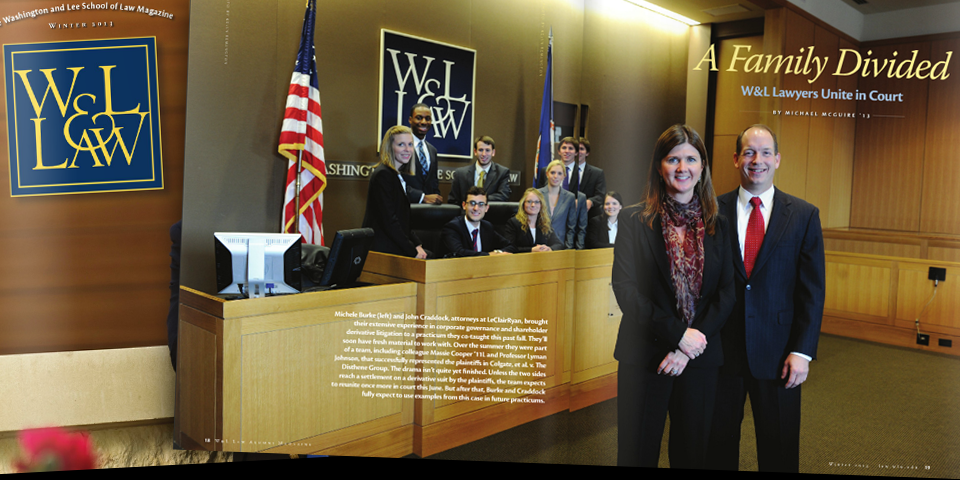 This article originally appeared in print in W&L Law alumni magazine on Jan. 29, 2013.
This article originally appeared in print in W&L Law alumni magazine on Jan. 29, 2013.For decades, Gene Dixon, the CEO of The Disthene Group Inc., a multi-million-dollar mining company in Buckingham County, Va., was literally king of a mineral mountain. He used company planes for personal vacations and large tracts of corporate timberland, in the foothills of the Blue Ridge, for quail hunting and horseback riding. He and his son, Guy, took exorbitant raises and bonuses and spent millions of corporate dollars on private life insurance policies.
All the while, minority shareholders in the company were receiving pitiful dividends and were being squeezed out of a 42 percent interest in the company.
“[The Dixons] used the company like their own personal piggy bank,” said Michele Burke, one of the attorneys for the plaintiffs in a lawsuit brought against Dixon by his own relatives with a minority share in the company. Burke is also a W&L Law professor of practice, teaching a third-year practicum course on corporate governance and shareholder derivative litigation.
“This was a clear case of minority oppression,” she said. In late August, Fairfax Circuit Judge Jane Marum Roush agreed with Burke in a fiery, 41-page opinion that effectively ended Dixon’s reign over the family business. She ruled that Disthene Group, the holding company that controls the family mining company and a hotel in Virginia Beach, among other things, should be dissolved and its assets, valued at over $100 million, divided.
“The judge basically saw the case as we saw it,” said John Craddock, another member on the plaintiffs’ legal team and the W&L professor of practice who co-teaches the third-year practicum course with Burke.
Burke and Craddock weren’t the only W&L Law players involved in this legal drama. Sitting alongside them throughout the trial—and for several months before the team set foot in court—was Massie Cooper, a 2011 graduate of W&L Law.
“I feel very lucky to be involved,” said Cooper, who started working on the case with Burke and Craddock at their Richmond law firm, LeClairRyan, earlier this year. “Trials nowadays are just so rare,” she said. “But for a first-year associate to go to trial is even less common.”
Cooper, who was a summer associate at the firm after her second year at W&L Law, said that even though she felt confident about her team’s case when court adjourned in May, she wasn’t sure exactly what the judge would have to say in the opinion she would return just three months later.
Roush called the Dixons’ actions a “waste and misapplication of corporate assets” and an effort to “retaliate” against the plaintiffs for a trust suit they won in 2007—also with Burke on their side. That case ensures them the company shares left to them through their grandfather’s estate.
The judge ruled that Dixon’s Disthene Group be dissolved because the minority shareholders in the company were “inherently disadvantaged” by their minority status in the company, with “no market for their shares should they decide to sell.”
“There is no reason to believe that the management of Disthene will ever treat the plaintiffs fairly,” she wrote.
“It’s a model opinion,” said Lyman Johnson, another W&L professor who also served as an expert witness for the plaintiffs in this case. “It’s must-reading for corporate lawyers in Virginia, regardless of whether they’ll set foot in court.”
That model opinion was hard won. It took months of planning and strategy sessions, sometimes held in Johnson’s office in Sydney Lewis Hall. During the three-week trial, Burke, Craddock and Cooper, and the other members of their
legal team, holed up in a small bed and breakfast, just footsteps from the courthouse. As soon as their day in court ended, the group hastened back to a makeshift office set up in a suite to plan for the next day.
“We had our computers, network connections, printers, everything” said Craddock. “We even had a room full of file cabinets.” The staff from LeClairRyan hauled two moving vans full of equipment to the small inn in Buckingham a few days before the trial started.
“We only went out for dinner twice in three weeks,” said Cooper. Every other night, she said, members of the legal team took turns preparing the quickest meals possible in the inn’s kitchen, to be shared while prepping for cross-examinations.
“It was a madhouse,” said Cooper, who made several trips to Costco for cold cuts to feed the lawyers and their clients during the lunchtime recesses.
Craddock made the coffee runs. Most nights the five-person team didn’t make it to bed before midnight.Then they got up the next day at the crack of dawn to get ready for eight more hours in court.
“We drank a lot of five-hour energy drinks,” Burke recalled.
Luckily, the team now knows what to expect when they return to court next June for part two of the case: a derivative suit in which the plaintiffs hope to get some of assets “borrowed” by the Dixons thrown back into the corporate pot, before it’s divided up among the shareholders.
It’s possible they’ll occupy the same bedrooms at that Buckingham bed and breakfast. It’s even possible that they’ll call the same expert witnesses for testimony. For sure, Burke, Craddock and Cooper will be working together once more.
“It is great to have this W&L team,” Craddock said.

